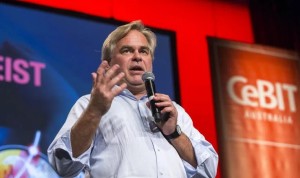"Kaspersky Lab" in the US court demands to lift the ban on government purchases of its programs
 The Russian antivirus company, Kaspersky Lab, appealed to the US federal court, Reuters reported . She demands to cancel the decision of the administration to limit purchases of its software by the US federal agencies. According to the Russian side, such a decision was made in circumvention of the due process. That is simply illegal.
The Russian antivirus company, Kaspersky Lab, appealed to the US federal court, Reuters reported . She demands to cancel the decision of the administration to limit purchases of its software by the US federal agencies. According to the Russian side, such a decision was made in circumvention of the due process. That is simply illegal.
It would seem how you can sue and demand that the client resume purchasing your programs. It sounds absurd. But here is a more serious problem.
American government procurement accounts for a tiny fraction of Kaspersky Lab's revenue: they bought programs for less than $ 54,000, which is only 0.03% of LK sales in the US market. It is primarily about damage to the reputation, said in a press release "LC" . Against this background, large commercial customers, including such retail chains as Best Buy, are beginning to abandon the products of the Russian company.
On September 13, 2017, the Department of Homeland Security (DHS) sent all civil federal agencies the Binding Operational Directive 17-01 directive instructing to remove the Kaspersky Lab software within 90 days.
Prior to this, in July 2017, the administration of President Donald Trump removed the Russian company from two lists of approved suppliers that are used by government agencies for centralized procurement of process equipment.
Among the reasons for such actions are possible informal cooperation with the FSB (this was a loud article in Bloomberg ) and concern that LC programs can be used for unauthorized access to American networks.
It is possible that the incident of 2015, which became known in 2017 with the leakage of the NSA's cyber espionage tools, caused a special offense to the American special services. These tools were on the home computer of an employee of the hacker special unit Tailored Access Operations - and there Kaspersky Anti-Virus was installed, which transferred files for analysis to the office of a Russian company.
As shown by the internal investigation of Kaspersky Lab , there was a similar incident, during which in 2014 it turned out to be the programs of the elite hacker group Equation Group and another suspicious archive that contained several malware samples and the source code of the Equation Group. It should be noted that the Equation Group is considered affiliated with the NSA . "Kaspersky Lab" says that immediately deleted the program and did not show it to anyone. The programs were on the home computer of a single American user, where Kaspersky antivirus software was launched, which transferred files to Moscow.
Kaspersky Lab writes that after the discovery of the source codes of the Equation Group, the company's analyst reported this to the CEO, that is, personally to Eugene, and at the direction of the latter, the files were deleted . However, in August 2016, these files were publicly available on behalf of a certain grouping of The Shadow Brokers. Then they laid out the second portion . Of course, declassifying these espionage tools was a painful blow to American cyber intelligence, if the Equation Group really works for the government.
So, the American special services had many reasons to tune in against Kaspersky Lab - and in 2017, an information campaign was launched against it about communication with Russian special services, the result of which was a ban on the use of software by federal agencies.
An appeal filed with an American court should help restore tarnished reputation in the eyes of Kaspersky Lab's American partners. The press release says that “DHS has damaged the reputation of Kaspersky Lab and its commercial operations without any evidence of an offense on the part of the company.”
Antivirus software "LK" is very popular in the United States and other countries, the Russian company for several decades is one of the world leaders in this market, releasing the highest level of software, as evidenced by independent tests. Now about 400 million people around the world use Kaspersky Lab products. Although, as Bloomberg writes, about 200 million are not aware of this (under licensing agreements, Kaspersky Lab’s programs are integrated into hardware, including firewalls and telecommunications equipment). Last year, the company's revenue amounted to $ 633 million, of which $ 374 million fell on the countries of Western Europe and the United States.
In October, Kaspersky Lab offered to disclose the source code of its software , as well as the code of all future updates, in order to lift the ban on government procurement. The American side replied that this was not enough.
All Articles